Vox Lux press conference with writer and director Brady Corbet, Natalie Portman, Stacy Martin and Raffey Cassidy
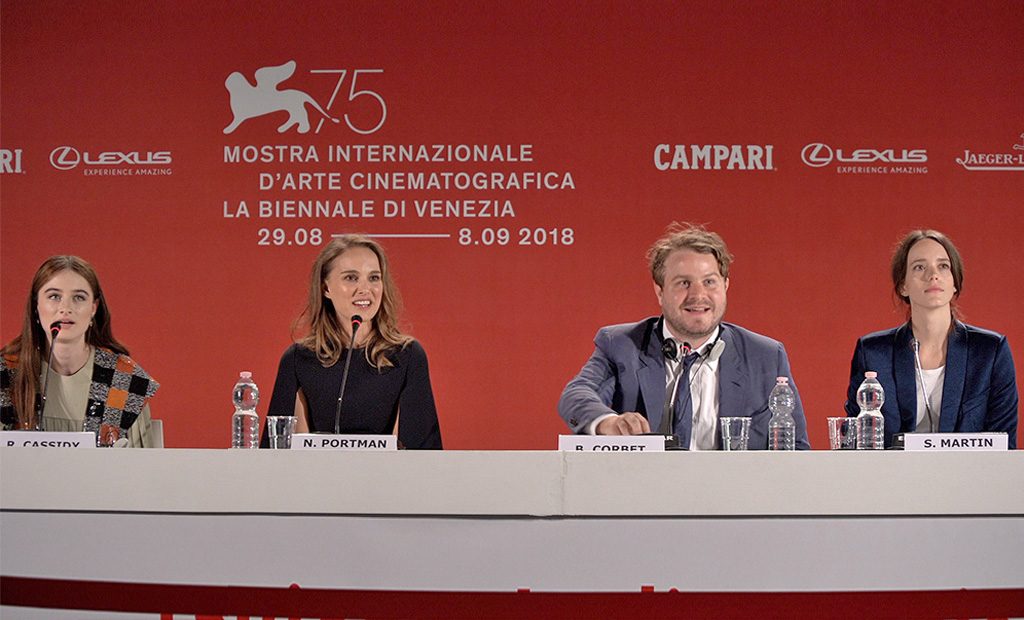
Vox Lux stars Natalie Portman as pop star Celeste and follows the singer’s rise to fame after a national tragedy in 1999 and her life over the next 18 years. Written and directed by Brady Corbet (The Childhood of a Leader), the movie also stars Jude Law, Stacy Martin and Raffey Cassidy.
The film had its world premiere at Venice Film Festival and at the press conference Corbet and his cast spoke about the psychology of violence, the difference between being a film star and a pop star and working with Sia.
Brady, I see an immediate connection between this film and The Childhood of a Leader. You connect the life of your protagonists to some major historical events – 1999 was Columbine, then the twin towers, 2017 the Ariana Grande concert. Can you talk a little bit about interpreting the historical and the personal narrative?
Brady Corbet: I’m a fan particularly of Robert Musil’s book The Man Without Qualities, which is about a character who is on the periphery of major events during the fall of the Austro-Hungarian empire. It’s quite sardonic and I decided to apply the Robert Musil style and tone to something contemporary.
Natalie, did you get to meet the singer Sia, what did you think of her music? And singing vs ballet, you’ve premiered both of your movies here when you’ve shown very different skills. Which was the most fun?
Natalie Portman: I really loved the opportunity to get to play this character. It was beautifully written and complicated, and of course to play a pop star is a dream. I’ve been a fan of Sia for a long time. Of course, I’m not playing her but I get to sing the music that she wrote – that’s a great luxury. I didn’t meet her for this film but I had met her before at various events and she’s always been really lovely and has a passion for dance. She’s really unbelievably talented, I’m in awe of her, so it was really fun to get to do. And relative to [dance and song], it was a completely different experience and moments in my life and also very different styles of characters and storytelling. This has been a joy; Brady created a very free, creative environment and I got to work with these incredible women, actors I admire and love. It was fun every day.
BC: Sia writes for so many different artists as well as herself, she’s incredibly prolific and I couldn’t have dreamed up a better collaborator for this particular project because the character is an amalgamation of characters both real and fictitious. The idea that she’s written for so many pop stars and so many different styles of music allowed the music to match the character.
Natalie, do you think this film could be a statement or send a message to the US about gun policy because these massacres keep happening?
NP: It’s not a movie about having a message, I think it’s a piece of art that’s more of a portrait and a reflection of our society and this intersection of pop culture and violence and spectacle that we equate between the two. When I read [the script] it was such a reflection of the moment we live in, it gave you a feeling the way art does. I hope it makes people feel things that they recognise.
You’re an Oscar-winning actress and a movie star, how different is that from a pop star, from what you learnt from this movie? Also, is this a portrait of the pop star as a monster and if so, what was the jump from her traumatic childhood to when you start playing her in the movie?
NP: I think there’s a big difference in the ego system that grows around a pop star as opposed to a film star. You have this work family and I think that can become really corrupted when your real family, the relationship with Stacy and I, becomes so corrupted because of that mix of love and commerce. That’s something, when you travel and you are on the road and living together, it’s quite different from what we experience on films. It’s more a project size, it’s not a year in a bus or on planes. I don’t really see her as a monster, but I don’t think you can necessarily look at your character with judgement, you have to live as her.
BC: Also, the character suffers from PTSD and she’s really not designed to be a monster at all, she’s as much a victim of the era as she is a leader of the era. The 20th century was marked by the banality of evil and I think the 21st century will be defined by the pageantry of evil. The film’s themes and the character are intrinsically linked. She’s not a monster.
Loss of innocence of the character and of the nation? How much did you discover of yourself by taking this character’s role?
NP: Well, I think it’s astute that there’s a definite theme of loss of innocence. We didn’t do a lot of work together trying to combine the characters because she’s a completely different person after those 15 years so she should look and feel and see differently. It was incredible for me to see it afterwards and see what Raffey did with the character. It was so different from where I picked up Celeste. I don’t love to compare myself to my characters because I think that’s the whole joy, exploring someone else’s mind. I was nervous about picking parallels.
Raffey Cassidy: I think on the day of the incident, all of her childhood was lost and everything changed for her. It’s very different from when Natalie does it because I think people are still trying to take that away from her. The manager etc. But at the same time she still goes around with her sister. So it’s still there when she’s younger, it’s just very different when she’s older.
Natalie, is there any Israeli influence on your decision to be involved in politics because of living with terror?
NP: I think I’ve definitely been interested in the questions around the psychology of what violence does to individuals, to mass psychology, group psychology, being from a place where I have encountered it for so long. Unfortunately, it’s a phenomenon we experience regularly in the US with the school shootings, which, as Brady has put it to me before, are a civil war we have in the US, and terror and the psychological impact of what that means to go to school every day and parents dropping children every day at school and how small acts of violence can create widespread psychological torment.
In the film there’s a moment when she says “Let’s make it ‘we’”, and it becomes a collective trauma. Can you expand a little?
BC: I’ll do my best. The thing is I did my best to make a film that is a chronicle of moments that defined the early 21st century – in the last 20 years we’ve all been through a lot. I almost said everything I had to say in terms of my evolution and development until this moment in time. It wasn’t an attempt to create something that was too didactic, it was supposed to be a sort of fable or poetic rumination of what we’ve been through in the last 20 years. I think…we live in an age of anxiety, we’re all having more sleepless nights than ever. The film was born of that, it was designed to be something where we could all come together and think about it collectively.
Raffey, it doesn’t happen every day you play a character and the character’s daughter in the same film. How was it?
RC: When I first read to Brady I was midway through reading the script. But then Brady told me about these two completely different characters and how enthusiastic he was about it. I really wanted to play it so I was very happy when he offered it to me. I thought it was very cool to have to create these two different characters, certainly without it being gimmicky. I think with the way Brady writes, that didn’t happen.
Why the voiceover?
BC: I always thought of the film as an historical portrait, not a topical movie. Because it’s about the very, very recent past, it ends in 2017, I wanted to make sure that as soon as you heard the narrative voice you were inside a fable, it’s not a neorealistic film. I wanted to set the tone.
Can you talk about the connection between the The Childhood of a Leader and this movie and the complex relationship with childhood and evil?
BC: I do see them as linked in a way. Structurally…the fact they are both fables about defining moments of an era. One early 20th century, this one in the early 21st century.
Is there a statement about journalists, that these people who have nothing to be proud of, why?
BC: Not at all. The character of course feels attacked and she lashes out at everybody. In the scene with Christopher Abbott, who plays the journalist, they both have valid point of views. She’s mostly wrong in fact. The most important thing is not when Stacy’s character says the journos have nothing to be proud of, I don’t share that sentiment. The most important thing is when she goes “Right, you’re right” and that’s the reason it appears in the film because she’s consoling herself by basking in a lie to try and comfort herself. The character of course has a few moments that are a little bit Trumpy and that’s one of them.
Stacy, you have to protect Natalie and take the hit for her. How is it hard for someone to accept a star’s behaviour?
Stacy Martin: It was all set in the script. What she decides in the hospital scene is that she will give herself over to her sister, so that whatever happens to her she would be there. I think it’s that commitment that she gave Celeste that defines her behaviour because she has to constantly be the counterpoint of Celeste. It was something I had to discover during the film. It’s more commitment and love rather than her decision of being there and supporting Celeste, it comes from a very pure place
Columbine happened in 1999, how did you live through that massacre?
BC: I grew up in Colorado so I was living there when Columbine happened. Yes it was a major event in my life, marking me psychologically. But I decided of course to not make it Columbine because I wasn’t interested in exploiting a tragedy that specifically. I kept it more generalised.
And the Jonathan Demme dedication? He gave you an award here three years ago?
BC: I knew him in the final years of his life and the prize he gave me at this festival changed my life. He also looked after me and my film, which he did for many young directors in the final years of his life and I was very, very upset when he died. And also Jonathan, the one person who would have really liked this movie was Jon Demme. He loves these movies. I think he would have really appreciated it.
How did you prepare for your roles?
SM: I started from the script and I spoke to Brady about his way of working, that helps as well to position yourself to approach the character. A lot happened being on set, you can only do so much before. I did some dialect work, on a very practical level, those kinds of things.
NP: I watched a lot of pop documentaries that are out there, I don’t’ want to necessarily call out which ones because it’s not about a particular pop star or inspired by a particular one but there were a lot of helpful details I learned from watching them. And the script was of course enormously helpful. And the dialect coaching and the dancing, which my husband choreographed so we got to rehearse it at home, which was very nice, and the recording of the songs was very scary but also fun at the same time.
RC: For me it was the first stage when I was speaking to Brady and hearing his ideas about the two characters and the difference he wanted between the two characters. With the dialect especially it was trying to have a slight connection between Natalie and Stacy, but very subtle so I think that was an important thing we prepped with. A lot of it was on set with the cast on the day.
And the formal choice of starting with shooting in 35mm?
BC: I’m very fortunate that I made all my films in 35mm. It’s not an option for more young filmmakers, it’s such a shame. It’s such a bad idea to take this important tool out of the box. It’s like the difference between water colour and oil and one is not better than the other. The idea that anyone would take oils away from a painter is absolutely tragic. This film is about the digital revolution, all of you saw it today projected on celluloid and hopefully it will be shown the way it was meant to be shown as often as possible.
Talking about music movies, I think Peter Watkins is an influence for you. How do you deal with the genre of music films within your films, with their historical references?
BC: I love the Watkins film. I didn’t think…I didn’t really approach it as a music movie, I approached it like a drama. But of course there was so much preparation that went into the pop songs. We had to work on putting together the soundtrack for nearly a year before we were ready to think about production because so many things have to be prepped in advance for the choreography and the lipsync. In regard to music movies, I have no idea where it sits in the pantheon, I enjoyed making one and I’m thrilled that I’m not making another one.
Laura Denti
Video/photo: Filippo L’Astorina
Vox Lux does not have a UK release date yet.
Read more reviews from our Venice Film Festival 2018 coverage here.
For further information about the event visit the Venice Film Festival website here.

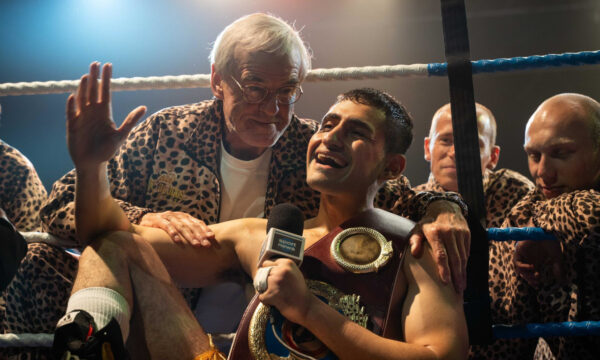
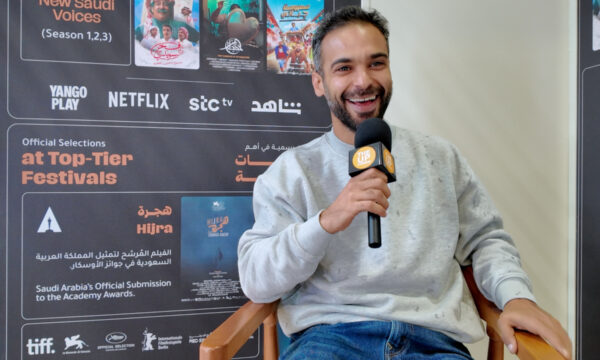
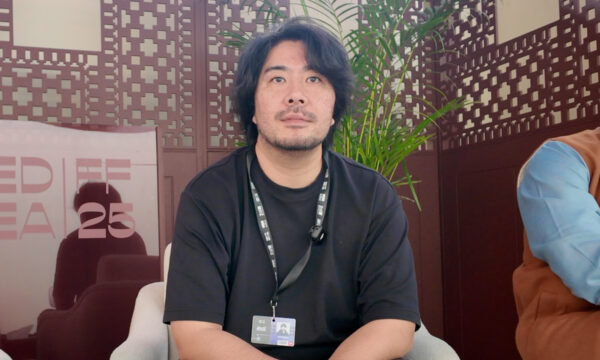
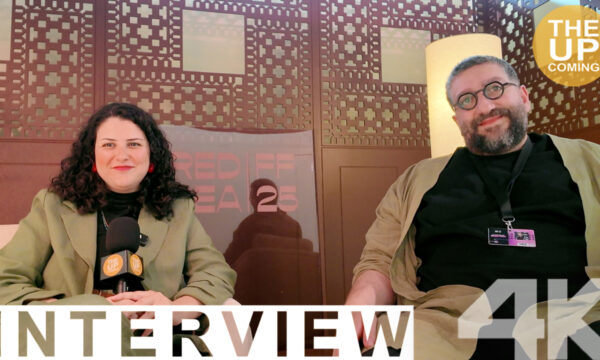
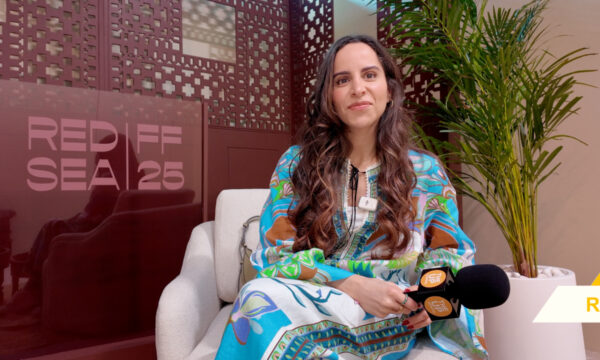
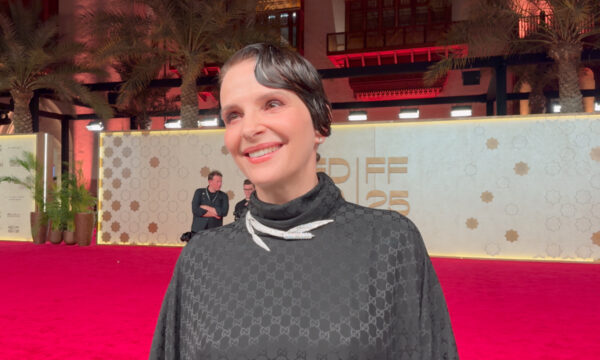
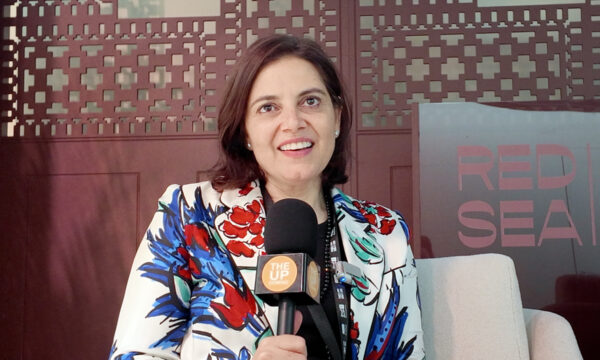
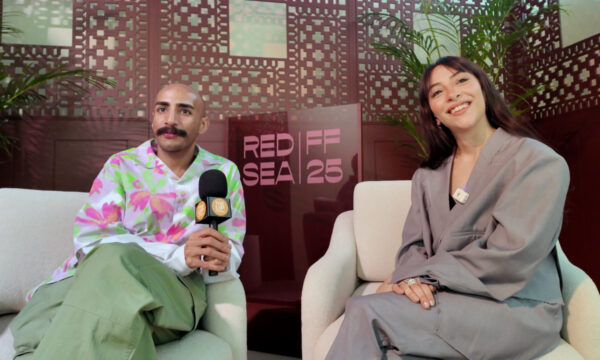
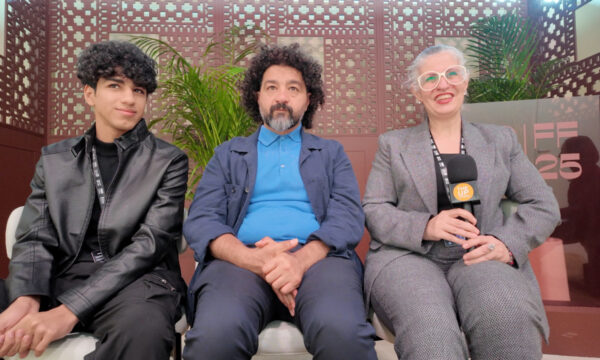

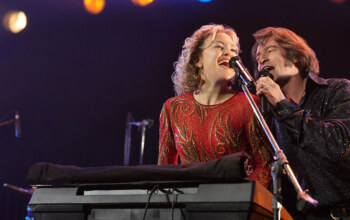


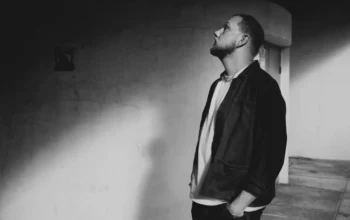









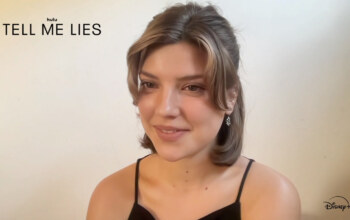
Facebook
Twitter
Instagram
YouTube
RSS